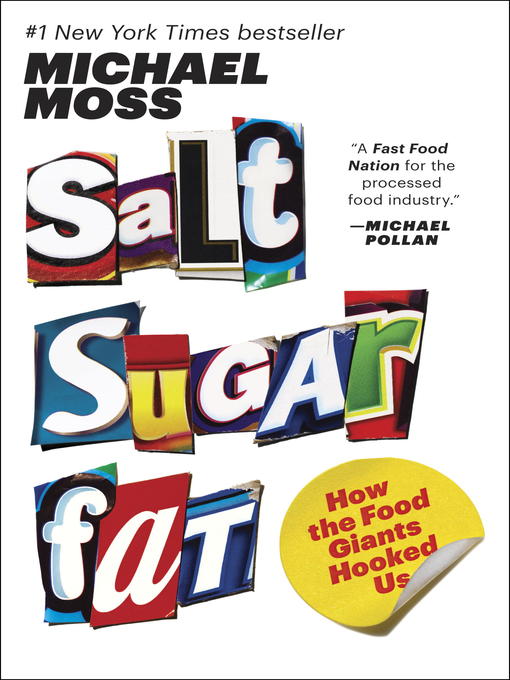
Salt Sugar Fat
How the Food Giants Hooked Us
فرمت کتاب
ebook
تاریخ انتشار
2013
Reading Level
9
ATOS
10.2
Interest Level
9-12(UG)
نویسنده
Michael Mossشابک
9780679604778
کتاب های مرتبط
- اطلاعات
- نقد و بررسی
- دیدگاه کاربران
نقد و بررسی

January 7, 2013
American cuisine is just a delivery system for an addictive trinity of unhealthy ingredients, according to this eye-popping exposé of the processed food industry. Pulitzer-winning New York Times reporter Moss (Palace Coup) explains the two-faced science of salt, sugar, and fat, which impart tantalizing tastes and luscious mouthfeel that light up the same neural circuits that narcotics do—Coca-Cola, he notes, calls favorite customers “heavy users”—while causing epidemic obesity, cardiovascular disease, and diabetes. But he also crafts an absorbing insiders’ view of the food industry, where these ingredients are the main weapons in a brutally competitive war for stomach-share. He takes readers into the laboratories, marketing tests, and boardrooms where the sweet, salty, cheesy “bliss point” of cereals, snacks, sodas, and frozen dinners is obsessively pursued; the scientists and executives he talks to feel torn between health concerns—almost to a person, he observes, they avoid eating the food they sell—and the market-driven imperative to stoke consumer cravings. Moss’s vivid reportage remains alive to the pleasures of junk—“the heated fat swims over the tongue to send signals of joy to the brain”—while shrewdly analyzing the manipulative profiteering behind them. The result is a mouth-watering, gut-wrenching look at the food we hate to love.

Starred review from February 1, 2013
A revelatory look at America's increasing consumption of unhealthy products and at how the biggest food manufacturers ignore health risks, and employ savvy advertising campaigns, to keep us hooked on the ingredients that ensure big profit. In an era where morbid numbers of people are living with diabetes, obesity and high blood pressure, New York Times Pulitzer Prize-winning reporter Moss (Palace Coup, 1989) discovers through ardent research--much of it interviews with current and former executives of Kraft, PepsiCo and other massive conglomerates--that there is shockingly little regulation of the processes behind the design and sale of foods purposely laden with dangerous levels of salt, sugar and fat. As the average American works longer hours and spends more time outside of the home, the demand for easy-to-cook and tasty meals has skyrocketed. In response, food giants provide an enormous slate of processed food options, almost all of which require immense amounts of salt, fat and/or sugar to cover the taste of poor-quality ingredients. Pulling no punches, the author points out that the recent trend of "healthy" items is no loss for these food manufacturers, who capitalize on creating new lines of spinoff products labeled "low-salt" or "sugar-free," when in fact those products require a significant increase in one of the other triad of flavors to remain palatable. Many products are laden with these ingredients in ways that would surprise the consumer: A single cookie, for example, might require several servings' worth of undetectable salt to retain its irresistible crunch, while it also contains up to five teaspoons of sugar. Moss breaks down the chemical science behind the molecular appeal of these foods, as well as behind the advertising strategies that are so successful in getting consumers to buy not only the "healthier" versions of popular foods, but the originals, as well. If this trend is to be reversed, he argues, it might take a social revolution of empowered consumers, a goal within reach if accurate information is available and pressure is put on these companies to dramatically alter the contents of its processed foods. A shocking, galvanizing manifesto against the corporations manipulating nutrition to fatten their bottom line--one of the most important books of the year.
COPYRIGHT(2013) Kirkus Reviews, ALL RIGHTS RESERVED.

October 15, 2012
A Pulitzer Prize-winning investigative reporter at the New York Times, Moss delivers an indictment of the processed-food industry. In fact, he's been doing that pretty regularly in the pages of the Times, with challenges to USDA Food Safety Practices and stories of tainted meat that make your stomach clutch. Here, he takes the Big Three--salt, sugar, and fat--and shows how the food industry has used these basic, inexpensive ingredients to get us actually addicted to food we don't need in our systems and is slowly killing us. Read after lunch.
Copyright 2012 Library Journal, LLC Used with permission.

February 15, 2013
The U.S. has the highest rate of obesity in the world, much of it due to the abundance of cheap, calorie-rich, processed food. Food companies manipulate our biological desires to scientifically engineer foods that induce cravings to overeat, using terms like mouth feel for fats and bliss point for sugars to tinker with formulations that will trigger the optimum food high. Coke even refers to their best customers as heavy users. Moss portrays how the industry discovered the allure of added sugar in the 1900s, and has been jacking up the levels ever since, without regard for consumer health, in everything from soda to breakfast cereals to instant pudding, in a race for market share. The food industry is not about to change, but this book is a wake-up call to the issues and tactics at play and to the fact that we are not helpless in facing them down. Moss is an investigative reporter with the New York Times; he won a Pulitzer Prize in 2010 for his investigation of the dangers of contaminated meat.(Reprinted with permission of Booklist, copyright 2013, American Library Association.)

























دیدگاه کاربران